Interviewee – Fran Gouldsborough. Deputy Head of Health Science and Social Care (SPEAKING) / Louise Rook. Head of Health and Social Care (SPEAKING) / Eve Allen. Student, Health and Social Care (SPEAKING)
Music – A poppy, bassy instrumental dance-beat plays.
Scenery – The camera flashes through footage of a learner wearing a black face mask hooking an IV bag on an IV stand; a learner looking into the lens of a microscope as her tutor watches; a close-up of a medical dummy as an oxygen mask is placed over its mouth. The screen starts fading to green. Footage continues to flash – a learner gives a wheelchair user a fluffy teddy; a tutor holds the jaw of an anatomical skeleton and demonstrates; a tutor leans over a profile bed rail and guides a learner taking blood pressure on a medical dummy. The screen becomes completely green, and a white logo appears in the centre with text that reads “School of Social Science. Leeds City College”.
Song lyrics – “Cos I know we are the shape of things to come.”
Music – The introduction song ends. A gentle piano melody plays.
Scenery – The camera pans across a room of learners in a clean, light hospital room environment, all wearing plastic aprons and surgical face masks. Some stand and others sit in blue wingback chairs; they all listen attentively to someone off-screen. The camera cuts to a learner sitting at the side of a profile bed with a medical dummy lying in it. Another learner, with her back to the camera, looks closely at a remote. The camera cuts to a woman with a fair, cool-toned complexion, brown eyes and long brown hair that falls over her right shoulder. A green box appears at the footer, with white text that reads “Fran Gouldsborough. Deputy Head of Health Science & Social Care”. She looks into the camera and speaks.
Speaker: Fran Gouldsborough – “One of the biggest selling points of-of Quarry Hill in our facilities is our practical care suite…”
Scenery – Cut to a close-up of a learner wearing blue latex gloves, placing a white napkin underneath a medical dummy’s chin. The camera cuts to two learners putting a sling behind a learner who sits in a blue wingback chair in the Practical Care Suite. The camera cuts to the same learner, now being lifted by a mobile hoist, as a tutor places an arm on her back and guides her position. A learner with their back to the screen stands in front of the hoist. Five students stand in the background and observe.
Music – The gentle piano melody continues, accompanied by ambient synths.
Speaker: Fran Gouldsborough – “This is a state of the art… it’s modern, it has got all the technology that you would find if you were potentially caring for somebody in their home, caring for somebody in the hospital, caring for somebody in a care home…”
Scenery – Cut to a learner lying in a profile bed, with a sling fixed around their back and legs. A student on either side of the bed securely fixes the sling into the mobile hoist arm. The camera cuts to a student with a fair complexion, long brown hair and a black face mask, lifting what appears to be a PVC blood bag above her head and fixing it to an IV stand.
Cut to a learner with a warm brown-toned complexion, dark-framed glasses and black hair tied in a bun as she checks the blood pressure of a medical dummy using a black pump and sphygmomanometer. A tutor with long grey-blonde hair and a rosy white-toned complexion reaches over the profile bed rails to pick up an aneroid gauge and read the pressure.
Speaker: Fran Gouldsborough – “And that means that our learners have a-a real opportunity to, not just learn about practical care, or about giving medication, or about manual handling. So, moves an-and rolls, but about how to physically do it…”
Scenery – Cut to a close-up of blue latex-gloved hands pumping a black pump, with a medical oxygen mask-wearing in the background. The camera cuts to three learners positioned around a learner who lies on a profile bed. The learner on the right lifts her left leg into a right-angle position, the learner on her left reaches over her to her back, and a second learner on her left reaches her bent knee. Together, they roll her to the left. The camera cuts back to Fran.
Music – The gentle piano melody continues,
Speaker: Fran Gouldsborough – “How it feels is actually the biggest part of it because the students, they take part. So they’re either doing the-the practical care, or they’re receiving it, and therefore, they gain such a massive level of empathy.”
Scenery – Cut to a learner with long dark reddish blonde hair supporting a learner’s back as she lays on her side on a profile bed. On her left, a learner changes the bedding around her. The camera cuts to a woman with long dark blond hair in a middle parting. She has a fair warm-toned complexion and wears a dark blue T-shirt. A green box appears at the footer with white text that reads “Louise Rook. Head of Health and Social Care”. Looking towards the left of the camera, she smiles as she speaks.
Speaker: Louise Rook – “We’ve also got a brand new, sparkling and fully functioning lab, a wet lab, um, which is coming in really handy for the new T-level science modules that we’ve got…”
Scenery – Cut to a bright white lab suite with blue chairs and cabinets. A group of students wearing white lab coats sit at workstations and look into microscopes as a tutor walks across the room. The camera cuts to a student intently looking into a microscope as the tutor stands behind her. The camera cuts to the tutor holding the jaw of an anatomical skeleton in demonstration. The camera cuts to a close-up of a skeleton hand being held by a learner as the tutor points to the wrist and joints. An aerial view shows them looking at the hand together.
Speaker: Louise Rook – “Erm, we’ve also got a beautiful nutrition suite, erm, where the learners can cook in their little teams, um, without feeling crowded. They can learn about healthy diet, they can learn about how to cook cheap and easy food as well as elaborate meals. They can learn baking skills…”
Scenery – Cut to a bustling kitchen environment with wood cupboards, black worktops and wood partitions. Learners stand at separate stations, stirring, cooking and measuring ingredients. The camera cuts to a learner melting chocolate in a stainless steel bowl over a pot. The camera zooms in to show swirls of chocolate and butter melting. Cut to a learner walking towards a cupboard and reaching for a syrup bottle. She wears a transparent plastic apron with a grey top underneath, has dark burgundy type-4 hair and a deep, tanned complexion. The camera cuts to a square of gooey chocolate brownie as it’s scooped from a deep rectangular baking tray. Cut to a close-up of bright red icing being hand-mixed in a white bowl. The camera cuts to a woman with long dark brown, middle-parted hair sitting in a blue wingback chair. She has a pale, cool-toned complexion and wears a light yellow cardigan.
Music – The gentle piano melody continues.
Speaker: Eve – “My name is Eve Allen, and I study Health and Social Care…”
Scenery – Cut to a tutor holding a scenario placard and speaking to students as they sit around her, engaged in the conversation. She flicks through different scenarios. On one card, black text on a blue background reads, “Your patient cannot stand by themselves. They need to go to the disabled toilet.”
Speaker: Eve – “The tutor’s really helpful. Most of them have actually worked as an actual, like, social worker or care worker, so that’s good because they can give you, like, on-hand experience…”
Scenery – Cut to a learner with a pale complexion and long red hair, administering a syringe into a medical dummy’s mouth as a tutor holds its head and observes. Cut to a learner holding a mobile hoist and positioning it in front of a student sitting in a wingback chair. Cut to a learner wearing a hospital gown, with one leg elevated, being pushed across the Practical Care Suite in a wheelchair.
Speaker: Eve – “And they can tell you, like, things they have actually experienced whilst they’ve worked, and it can help you kind of learn about health and social care because you’re learning from people who have experienced it…”
Scenery – Cut to the same learner being given a fluffy teddy bear by a learner wearing a transparent plastic apron. The camera cuts back to Eve. A green box appears at the footer with white text that reads “Student – Health and Social Care”.
Speaker: Eve – “When I first came, I didn’t know anybody at the college, but because it’s people you’re surrounded by and people with similar interests to you, you do make friends quickly, and you make really close friendships with people because you’re listening to the same things, and you’re going through the same things. And you can help each other as well.”
Scenery – Cut to a group of learners standing around a profile bed as one practices manually reading blood pressure on a medical dummy. As the camera pans across the practical care suite, it shows a student and tutor putting a learner, who sits in a wingback chair, into a sling. The camera cuts to Eve, firmly holding a mobility assistor as a learner grabs it to lower herself into a chair. The camera cuts back to Fran, who gestures with her hands as she speaks.
Speaker: Fran Gouldsborough – “They come from such a variety of backgrounds whether that’s school, or-or returning to college from work, or’ve been out of education for a number of years…”
Scenery – Cut to a close-up of Eve, wearing a black face mask and smiling at a learner who is just out of sight. The camera zooms in to show the learner has a foot between Eve’s knees, and she carefully ties their shoelaces.
Speaker: Fran Gouldsborough – “And they… you know- that you get that kind of initial, kind of, maybe quietness and timidness, and then you see the groups that they form and the friendships that they make and, and the confidence that they then have to partake in their sessions, in their work experience…”
Scenery – The camera cuts to a learner practising administering an IV drip. Wearing a transparent plastic apron with brown hair and a bright red ponytail, she smiles and laugh through a surgical face mask. The camera cuts to Eve sitting opposite a learner in a blue wingback chair as she pours milk into a bowl and then spoons cereal into her mouth. Cut to a tutor with brown hair, holding an anatomical skeleton model’s jaw, as a learner observes. The camera cuts back to Fran.
Speaker: Fran Gouldsborough – “Erm, and particularly work experience, I think, is usually quite a pivotal point in their-in their course for the-for the higher levels…”
Scenery – Cut to a front-facing view of the lab suite, with students sitting on workstations in rows and focusing on their microscopes. The camera cuts to a student with long black hair, tanned olive skin and a surgical face mask looking into a microscope as a tutor stands behind and observes. The camera cuts to a close-up of a hand adjusting a microscope focus knob. The camera cuts to Eve applying a bandage to a learner’s wrist, and it zooms in as she carefully wraps the white gauze around it.
Speaker: Fran Gouldsborough – “It’s.. they come back, and they are, they’re full of all these experiences that they’ve had, and they’ve seen what we’ve taught them in class, and they’ve then experienced it for real life. They’ve even come back and said, ‘this maybe wasn’t done as it should have been,’ and I, I try to make it better- or I try to help. So, that challenging best practices is something that’s amazing that they then have the confidence to go and do, which, on day one, they really don’t.”
Scenery – Cut to a close-up of a medical dummy as an oxygen mask is placed over its mouth. Cut to a learner with black circle-framed glasses and dark-blonde hair resting her left arm over her right clavicle, as it is secured in a white fabric sling. Cut to two learners sitting and guiding a learner who holds up a medical vest and places it around their body. The screen fades to a bright green colour, and a white logo appears in the centre, with white text that reads “School of Social Science, Leeds City College”.
Music – The gentle piano ends on a soft chord before fading to silence.


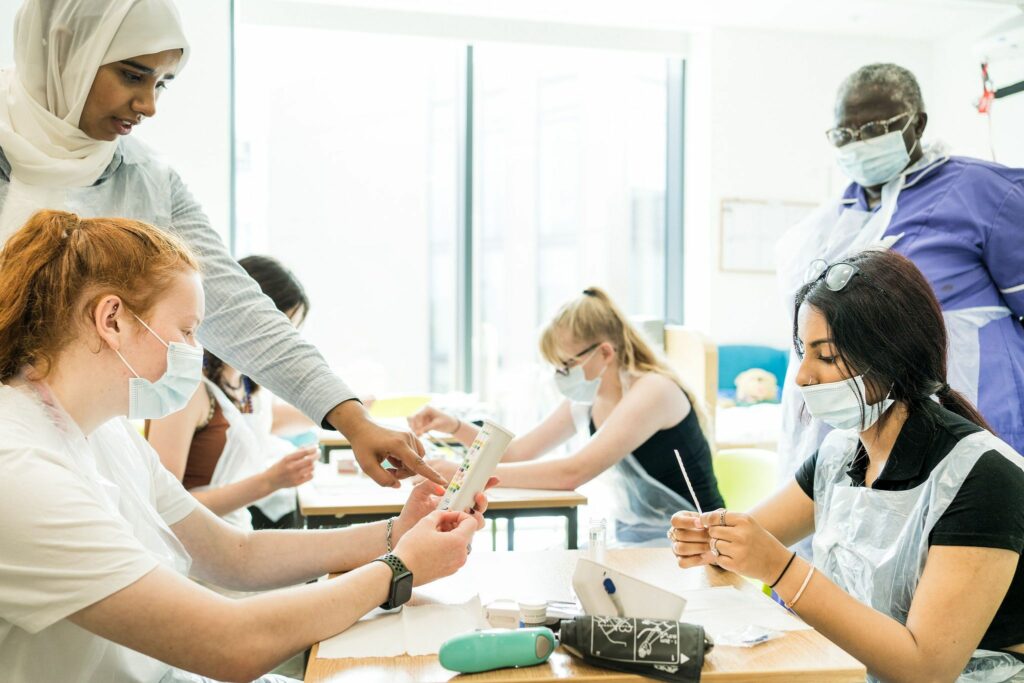
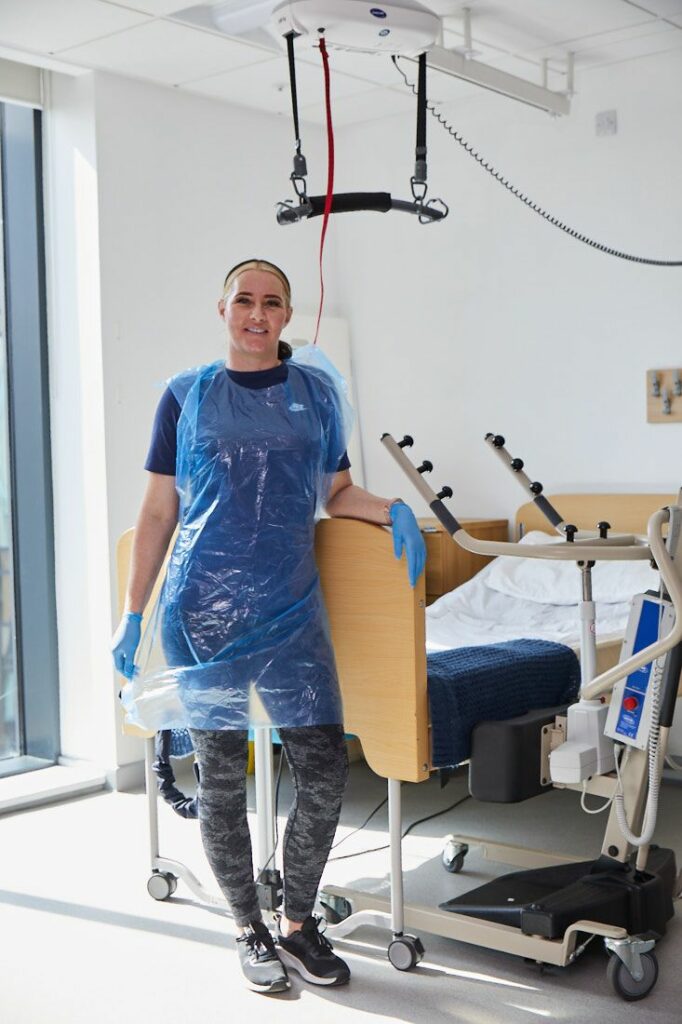
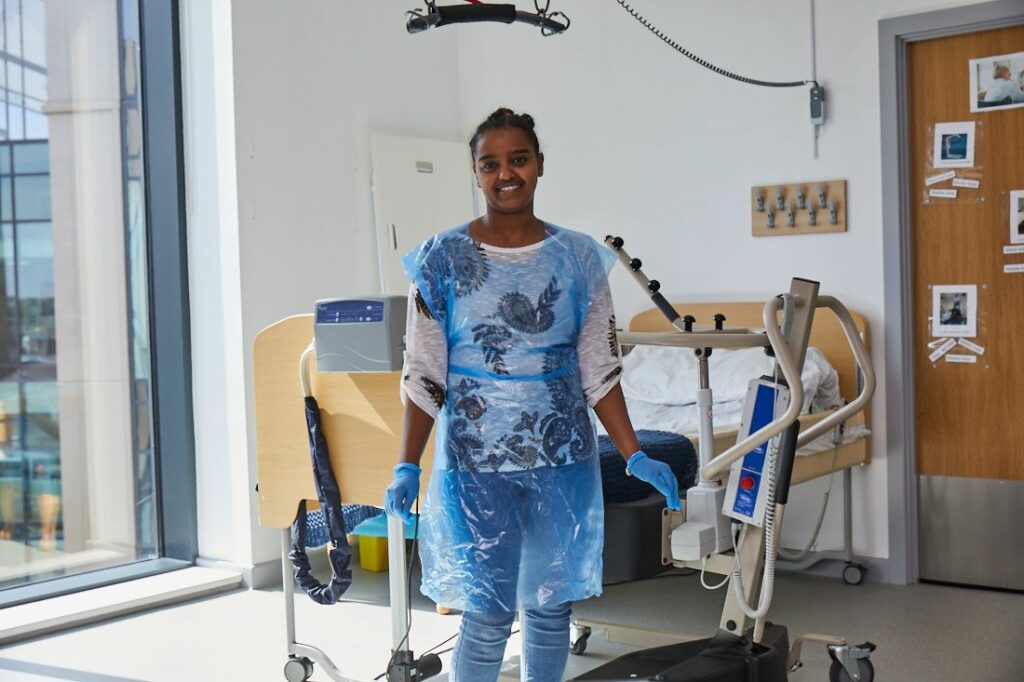

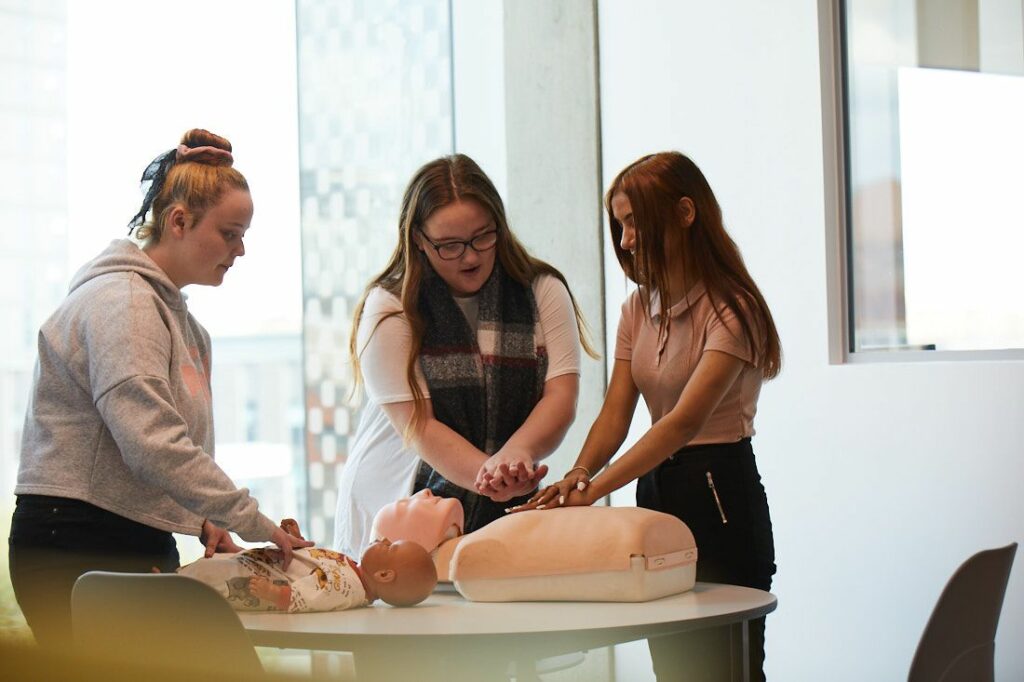

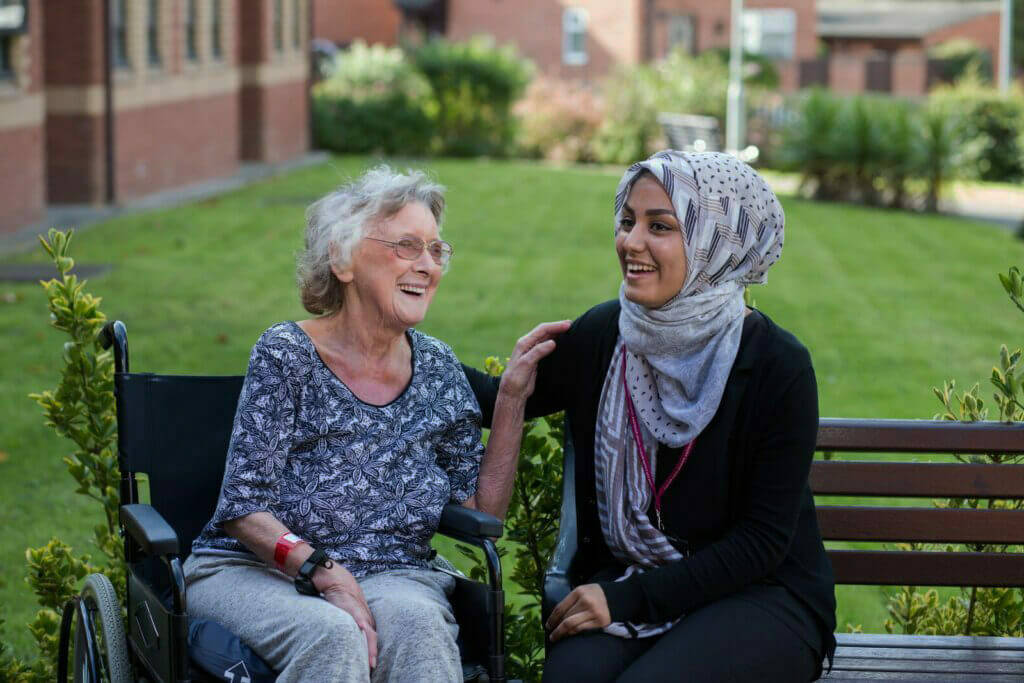
Follow us on Social Media